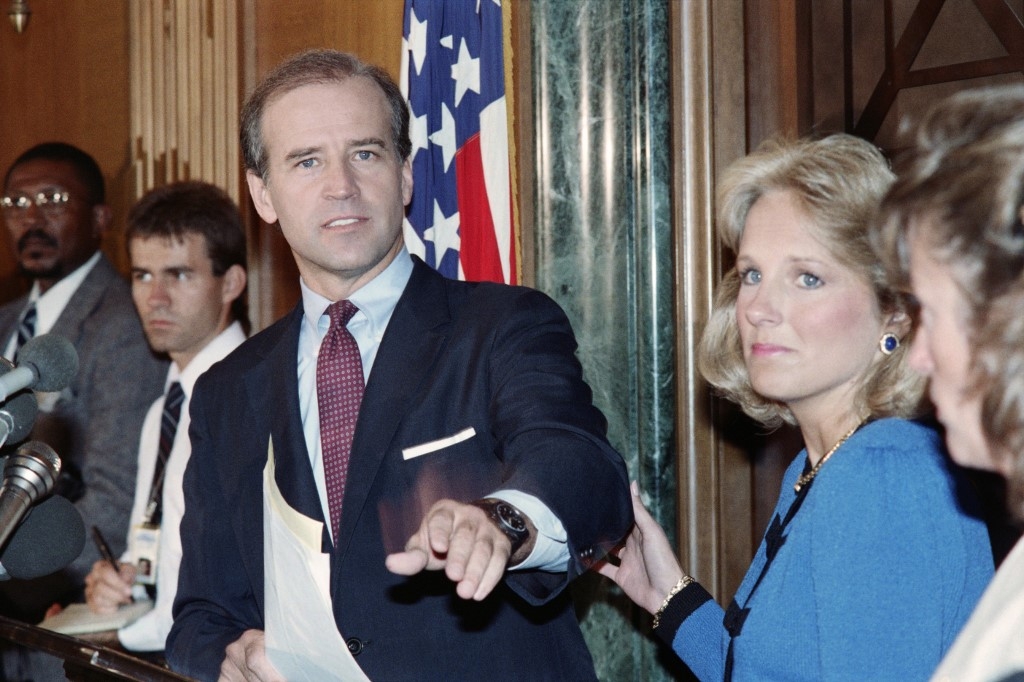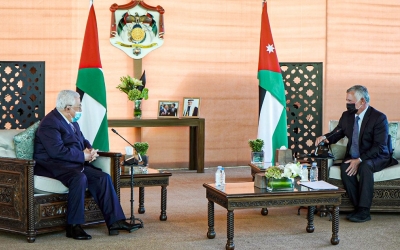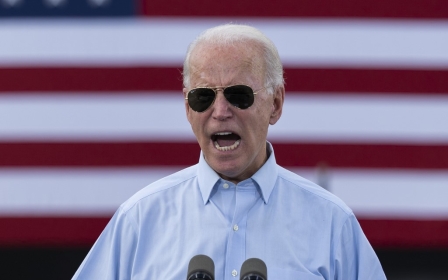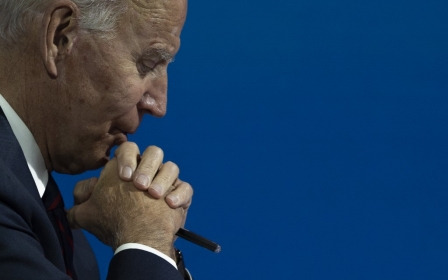Rare documents from 1986 meeting reveal Biden's initial views on Israel

Rare decades-old documents suggest a young Joe Biden was an ally of Israel but reluctant to get involved with pro-Israel advocacy, an Israeli newspaper has revealed.
The declassified documents, recovered from Israel state archives records by Haaretz, reveal a glimpse into a February 1986 meeting between then-senator Biden and Israel's former ambassador to the US, Meir Rosenne, and then-embassy staffer Yosef Lamdan.
At the time, Biden was a little over a year away from announcing his 1988 run for the US presidency.
'Biden believes that the U.S. should tell the Arabs that Israel is foremost among its friends, and that if the Arabs had a problem with that, they should be aware that they would have a problem with the U.S. as well'
- Yosef Lamdan's 1986 meeting notes
Rosenne and Lamdan were aware of Biden as a potential presidential candidate but considered his chances of victory slim, Haaretz reported after viewing the embassy documents, which were once marked as classified and sent to Jerusalem.
Still, Lamdan, who was responsible for embassy relations with Congress, documented that Biden had insufficient ties with Israel, as he was not involved in the Jewish-Democrat politics of Washington and did not have much to do with any pro-Israel organisations.
New MEE newsletter: Jerusalem Dispatch
Sign up to get the latest insights and analysis on Israel-Palestine, alongside Turkey Unpacked and other MEE newsletters
At the time, Ronald Reagan was president, and Republicans were viewed as the party that was less friendly to Israel compared with the Democrats.
Today that dynamic has shifted, as has Biden's reputation, with the president-elect well known for having frequented pro-Israeli lobby meetings with groups such as the American Israel Public Affairs Committee (AIPAC) and J Street.
'A frank exchange'
While Biden had supported major pro-Israel campaigns in Congress back in the 1980s, lists created by the embassy at the time did not place Biden in a category of for or against Israel, indicating he was viewed as neutral.
His meeting with Lamdan and Rosenne, however, seems to have marked a pivotal change in Israel's perception of Biden, as the two embassy officials painted the then-senator as an enthusiastic supporter who, during the meeting, had expressed a stance that the US was at times too critical of its ally.
According to three pages of embassy notes on the one-hour sitdown, Lamdan wrote that Biden said he believed US officials openly criticising Israel - despite the US providing support for the country as an important ally - was "paradoxical and a mistake," according to Haaretz.
"[Biden] wanted to say that even though the positions of the U.S. were, with a few exceptions, alright, the U.S. continues to claim outwardly that it wishes to be equally friendly to all sides," Lamdan wrote, referring to US efforts as a mediator between Israel, Palestine and surrounding Arab countries.
"Biden believes that the U.S. should tell the Arabs that Israel is foremost among its friends, and that if the Arabs had a problem with that, they should be aware that they would have a problem with the U.S. as well," Lamdan continued.
Biden reportedly told the embassy officials that "the U.S. should change its public debate with Israel" and that if he were president, the US would treat it "like it treats its other friends".
"It would be inconceivable to openly argue with Mrs. Thatcher on disputed topics, but in the case of Israel, the U.S. does not hesitate to openly disagree with it. This approach is unacceptable to him," Lamdan noted.
"If he were elected, he would have a frank exchange with us, without publicity and through diplomatic channels".
Four months later, Biden made similar remarks when addressing the US congress.
"It's about time we stop apologising for our support for Israel," he told lawmakers that June. "It is the best $3 billion investment we make. If there weren't an Israel, the United States of America would have to invent an Israel to protect her interests in the region."
Looking forward
Biden is expected to reverse or temper some of the more status-quo-breaking moves made during US President Donald Trump's presidency regarding Israel and Palestine.
While the president-elect initially opposed the Trump administration's US embassy move to Jerusalem, Biden has stated that he has no intention of moving it back to Tel Aviv.
Instead, his administration plans to reopen the US consulate in occupied East Jerusalem to serve Palestinians. He will also reopen the mission of the Palestinian Liberation Organisation (PLO) in Washington, which was shuttered by the Trump administration.
In the past, Biden had been a hardliner against the PLO, which, now a recognised observer member of the United Nations, had been considered a terror organisation until the early 1990s.
During his 1986 meeting with Rosenne and Lamdan, he compared the PLO to the Irish Republican Army (IRA), a paramilitary group that originally fought British colonial rule during the country's War of Independence (1919-1921).
"As someone of Irish descent, [Biden] considered the IRA to be like any other terror organization which would never compromise with the moderates, with the lowest common denominator always holding sway," Lamdan wrote.
At the end of the meeting, Lamdan said that "Biden repeated his commitment to Israel," adding that he "believes the United States did not do enough for the Jews during World War II. He ended by saying that we wouldn't be sorry if he were elected to the White House."
Speaking more recently to Haaretz, Lamdan said he did not remember his 1986 meeting with Biden, and Rosenne passed away in 2015, so neither man was able to provide further insight.
Biden has said he will reinstate several Palestinian aid programmes that the Trump administration has cut, such as funds for security cooperation, economic development, and humanitarian aid.
But he has also echoed the Trump administration's view of conditioning aid to the Palestinian Authority (PA) on cuts to government welfare payments that go to the families of Palestinian prisoners and Palestinians killed by Israel, a policy the PA has refused to negotiate.
At the same time, Biden has vowed to re-enter a nuclear deal with Iran, a position Israel has strongly argued against as it considers Tehran a fierce rival.
This article is available in French on Middle East Eye French edition.
Middle East Eye delivers independent and unrivalled coverage and analysis of the Middle East, North Africa and beyond. To learn more about republishing this content and the associated fees, please fill out this form. More about MEE can be found here.






